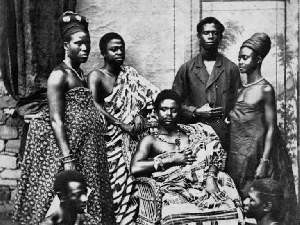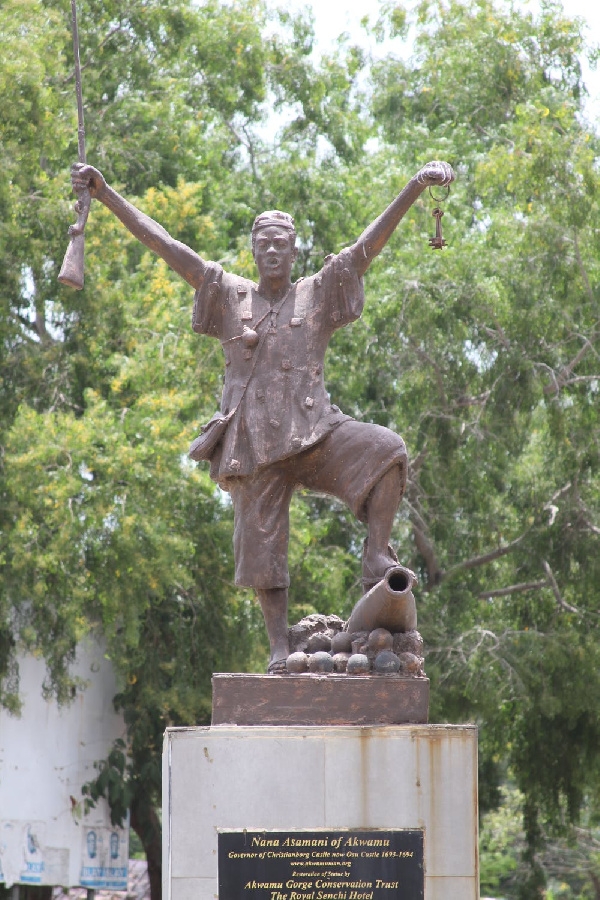 A photo believed to be of Nana Asamani with some other people | Eplange Library
A photo believed to be of Nana Asamani with some other people | Eplange Library
The legends of Nana Asamani, an Akwamu chief who frustrated the efforts of the Danes in the 1600s, will be the focus of GhanaWeb's Sankofa Series this Monday.
The chief is well-known for being the man who was bold enough to confront the colonial Danish people in 1693 when they wanted to trade in the business of the Christiansborg Castle with him.
Historical accounts also say that Nana Asamani tricked the Danes and seized the Christiansborg Castle from them, but later sold it back to them in 1694 for 50 marks of gold.
He, however, kept the keys to the castle.
It is worth mentioning that Nana Asamani became the first and only Black Governor of the Gold Coast, a title he ascribed to himself when he seized the castle.
Read the full accounts of his story below, as first shared on GhanaWeb by Ghanaian Museums:
The Osu Castle, also known as Christiansborg Castle, is a castle located at Osu, Accra, Ghana.
The Christiansborg Castle was built by Danish colonialists in 1659 on a land obtained from the paramount chief of Okaikoi, of the Ga ethnic group.
Over the years, the fort was juggled between the Portuguese, Swedish and Danish. At certain times, it was taken over by force; other times it was bought.
Seizing the castle
In 1693, Asamani, an Akwamu Chief, planned to seize control of the castle by way of a cunning trick.
A successful trader and warrior, Asamani moved to Accra, became proficient in the Danish language and disguised himself as a cook and interpreter to secure work at the castle.
He studied the site, and its occupants and operations, including the ships’ arrivals and departures, as well as those of traders, merchants and others who worked and visited the Christiansborg castle.
The Akwamu was a state set up by Akan people (in present-day Ghana) that flourished in the 17th and 18th centuries.
Asamani informed the Danes that he would escort a group of Akwamu traders to purchase ammunition.
In 1693, Asamani and 80 armed men impersonating traders entered the castle.
Since it was accepted practice to test merchandise prior to purchase, the men were given ammunition.
But they had also hidden ammunition, powder and shots under their clothes.
Once in the castle, the Akwamu attacked the unsuspecting Danes.
A fierce battle ensued. Severely wounded, Governor Janssen escaped to nearby Fort Crevecoeur.
Many Danish merchants and officials were injured, and some were taken to Akwamu as captives.
Asamani and his men captured the castle.
The Akwamu leader, Asamani occupied the Christiansborg Castle for a year, appointing himself “Governor” of Christiansborg Castle, trading with merchants from many nations.
He replaced the Danish with the Akwamu flag.
In 1694, Asamani sold the fort back to the Danes for 50 marks of gold (400 troy ounces, worth about $666,920.00 today) but retained the keys.

The bronze statue dedicated to the memory of Asamani, the brilliant strategist, and his capture of the castle, at the Atimpoku Roundabout in the Eastern Region of Ghana.
The AKwamu legacy
The keys are still in the ethnic group’s possession till this day and it had since been kept by the Akwamu as a trophy and a proud symbol of the resistance by the Akwamus from the Danes.
In 1957, when Ghana became independent, with Queen Elizabeth II as head of state, the fort became Government House, the residence of the Governor-General.
When Ghana became a republic in 1960, it became the residence of Ghana’s first president, Kwame Nkrumah.
Christiansborg Castle is currently marked a security zone and is not open to walk-in visitors.
A statue of Nana Kofi Asamani is at the Atimpoku Roundabout near the Adomi Bridge.
Click here to follow the GhanaWeb General News WhatsApp channel
Ghana’s leading digital news platform, GhanaWeb, in conjunction with the Korle-Bu Teaching Hospital, is embarking on an aggressive campaign which is geared towards ensuring that parliament passes comprehensive legislation to guide organ harvesting, organ donation, and organ transplantation in the country.
AE